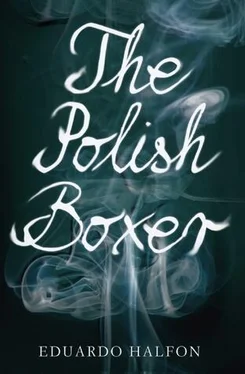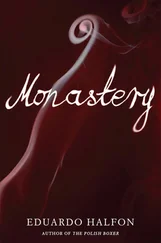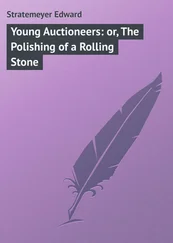Eduardo Halfon - The Polish Boxer
Здесь есть возможность читать онлайн «Eduardo Halfon - The Polish Boxer» весь текст электронной книги совершенно бесплатно (целиком полную версию без сокращений). В некоторых случаях можно слушать аудио, скачать через торрент в формате fb2 и присутствует краткое содержание. Год выпуска: 2012, Издательство: Bellevue Literary Press, Жанр: Современная проза, на английском языке. Описание произведения, (предисловие) а так же отзывы посетителей доступны на портале библиотеки ЛибКат.
- Название:The Polish Boxer
- Автор:
- Издательство:Bellevue Literary Press
- Жанр:
- Год:2012
- ISBN:нет данных
- Рейтинг книги:4 / 5. Голосов: 1
-
Избранное:Добавить в избранное
- Отзывы:
-
Ваша оценка:
- 80
- 1
- 2
- 3
- 4
- 5
The Polish Boxer: краткое содержание, описание и аннотация
Предлагаем к чтению аннотацию, описание, краткое содержание или предисловие (зависит от того, что написал сам автор книги «The Polish Boxer»). Если вы не нашли необходимую информацию о книге — напишите в комментариях, мы постараемся отыскать её.
marks the debut of a major new Latin American voice in English.
The Polish Boxer — читать онлайн бесплатно полную книгу (весь текст) целиком
Ниже представлен текст книги, разбитый по страницам. Система сохранения места последней прочитанной страницы, позволяет с удобством читать онлайн бесплатно книгу «The Polish Boxer», без необходимости каждый раз заново искать на чём Вы остановились. Поставьте закладку, и сможете в любой момент перейти на страницу, на которой закончили чтение.
Интервал:
Закладка:
We thanked them for the meal. The old man left. Petar and Dragan saw me out and Slobodan arrived a few moments later. It was still snowing. I held out my hand to Petar and he said something to me in Serbian. He says not to worry, translated Slobodan, if your Rakić does exist, he’s sure he’ll find him for you. I didn’t believe him. I could still hear the groaning of the truck or of a person being tortured or something equally horrific. We set off slowly toward the road. The snow creaked under our feet. In the distance, the groaning got louder. What the hell is that? I asked Slobodan, but he just lit another cigarette and kept walking.
Once we were in a taxi, I told him I thought Petar’s daughter was gorgeous. The blond girl, I said. The one with the hedgehog, I said. I thought I heard him sigh, though it could have been the wind or else the taxi driver. That’s not his daughter, he whispered after a while. It’s Dragan’s wife. Her name is Natalja. She’s my age. We were at school together, until she quit her studies because they made her marry him. She was fourteen then. I thought of asking Slobodan how he knew so much, but there was no need. It was obvious. I rolled the window down a bit and the air was refreshing. It was snowing harder. There was a lot of traffic and we spent more than an hour in complete silence, the two of us probably having the same fantasy or probably having opposite fantasies while we watched the city gradually grow dark.
The next morning it was snowing heavily. The windows were rattling and seemed about to explode. I turned on the TV and watched a whole news bulletin in Serbian, understanding no more than the apocalyptic images of deserted streets and trees blown onto electric cables and blinds of white wind and cars buried in the middle of small mountains of snow. Zdena called. She told me not to worry, that it was best not go to out, that this kind of storm generally lasted a day, two at the most, and that if I needed something, I shouldn’t hesitate to call them. I thanked her and we hung up. I looked out the window. No one. Irresistible, I thought. I grabbed my jacket, my gloves, and my hat, and went out.
I was surprised it wasn’t colder. It was almost impossible to walk in a straight line. Pellets of snow whipped at my face and neck, and a few times I had to duck behind a phone booth or a lamppost. I passed just one person and we greeted each other like two of those Japanese soldiers who never heard that the war was over and keep wearing their uniforms like total idiots and are still looking for the enemy in the middle of nowhere. The kiosk on the corner was closed. Nearly everything was closed. I kept walking down Pozeska Street. I could make out a red light in the window of a bar or café, but the door was locked. I rapped on it. A moment later, a woman arrived and said something to me through the glass and I shrugged and said hvala, which means thanks, and had nothing to do with anything, but it was the only Serbian word that came to mind. Scornfully, and at snowstorm prices, she sold me a liter of beer, a piece of smoked sausage, a bread roll, and a pack of cigarettes. Hvala, I said again, and walked back to the apartment, feeling strangely happy.
I spent the rest of the day shut inside, smoking and eating the supplies I’d bought and reading a bit and listening to a few pieces by Melodious and watching Venezuelan soaps dubbed into Serbian, and Russian films dubbed into Serbian, and American cartoons dubbed into Serbian, and taking short naps without dreaming or at least dreaming very little, and it was one day less, one day lost, one day further from everything and closer to nothing, while the hours didn’t pass so much as suddenly become one single hour, one single static hour like a bedsheet with no creases, one goddamn shitty and unbelievably eternal hour, so dark and so lonely and tasting of dead birds.
It’s passed, Slavko said to me over the phone, as though I’d had a fever. Maybe I did have a fever. It was nine in the morning. Outside, the wind had stopped moaning. I drew the curtains and saw that it had stopped snowing, too, but it was still overcast. Yes, I said, it’s passed. Are you leaving soon? he asked. Yes, soon, and I closed my eyes melodramatically, trying to imagine myself already in the warmth of Portugal. Slavko said I should have lunch with them, that a really crazy friend of his from Vojvodina was coming, and he wanted to introduce me. Sure, thanks, I said, and then, although I don’t know why, I went back to sleep for a few hours.
I left the building toward midday and was looking for a taxi — from any company, of course — when I heard someone shouting my name. It was Slobodan. Without the black suit, finally, and his hair even more messy and disheveled. He had the eyes of a man who hadn’t slept. This is for you, he said without even greeting me, handing me a piece of paper. Gardoš, I read, confused. It’s the name of a district, he said. On the other side of the river. Petar says he can’t be sure you’ll find anything but that you should try walking around there. Gardoš, I repeated. A district. Is that it? I asked, and feeling frustrated, I crumpled the piece of paper and put it in my jacket pocket. And the photo of Milan? I asked, but Slobodan was looking at something else and I thought he was about to cry. He just sighed. I need your help, he said, biting his nails and looking at me as if I were guarding life’s great secret. I don’t know if Natalja had been standing there all along or if she’d just arrived or if perhaps I’d decided not to see her — but there she was, all rosy and sad. And I suddenly remembered a legend Lía had told me, studious and devoted to quantum physics as she was. The legend says that as Columbus’s fleet was approaching the shores of America, the native Indians didn’t see it because they couldn’t see it, they literally couldn’t see it, since the concept of galleons in full sail was so alien to them, so unimaginable, that it didn’t enter into their version of reality, and as such, their minds simply decided not to register it. There’s nothing there, I remember Lía saying to me, with her hand on her forehead, as though she was watching the horizon. I construct my reality solely on the basis of that which I know, she said. Or something like that. I need your help, Slobodan said to me again, and I stood looking at them and somehow inserted them into my new reality. They were like two teenagers skipping class. I wanted to hug them. Slobodan was quiet. Natalja, without seeing me, said a word in Romany that had a beautiful sound, like a goldfinch’s trill, but I didn’t know what it meant and foolishly didn’t ask. I understood everything else, though. I told Slobodan of course, no problem, that I wouldn’t be back till late, and gave him the key to the apartment. I started to go, somehow both satisfied and also rather melancholy. Hey, he shouted, and I stopped. According to Natalja, he said, gesturing at her with his chin, doing a pirouette doesn’t mean anything to Gypsies. I know, I was going to say, but I just smiled.
When I got to the Lecićs’ house, a man with long gray hair and a goatee — the whole musketeer look — opened the door. I’m Neboyša Tuka, he said to me in English. I held out my hand. Have you brought the buffalo’s milk? he asked me. I didn’t say anything. Go and buy us a liter of buffalo’s milk, he said. I started to step back, a little afraid. Slavko appeared at the door on his crutches and, pushing him aside, said stop fucking around, Neboyša.
Marko had spread on the table all sorts of nuts, cheeses, sausages, hard-boiled eggs sliced in half and served with coarsely ground pepper, a tomato salad, and a casserole of chopped vegetables and something spicy called ajvar. They poured a few glasses of beer. As we ate, Neboyša talked about Vojvodina and about his chauffeur, who was waiting outside for him, and he kept glancing out the window. I think my anxiety was sparked when I tried a bite of the apple tart, although when I think about it, that’s not right at all, because the anxiety was always there, but well camouflaged. Neboyša asked me something and, I don’t know why, I said yes. I drank half a glass of warm beer as an anesthetic. I was sweating. I felt the crumpled piece of paper in my pocket and became even more anxious. Gardoš, I whispered, as though to calm myself down. While she made the Turkish coffee, Zdena asked me if I’d been to Knez Mihajlova. It’s a really lovely pedestrianized street, she said, there are loads of restaurants and cafés with terraces. I don’t know, maybe, I replied, remembering the two Gypsy siblings dancing between the tables of a Degas painting. I lit a cigarette. I think you’d like it, she said. Neboyša said something in Serbian. Everyone laughed. They’re saying, Zdena explained to me as she sat down, that Knez Mihajlova is where everyone goes to be seen, all clean-shaven and dolled up and wearing their best clothes and their best shoes, even though they haven’t got two pennies to rub together. It’s ridiculous, added Neboyša. They spend all their money on some rip-off outfit and some rip-off coffee, when they don’t even have food to eat at home. Seventy percent of Belgrade is chronically depressed, said Slavko, and I wanted to ask him how he’d arrived at that number, but Marko, who until then had been quiet and pensive, started to tell me the story of a neighbor who used to beat a chopping board with a wet rag in the evenings. What for? I asked, finishing my coffee. So that we’d all think she was tenderizing a piece of meat, he said. She didn’t have the money to buy meat anymore, obviously, but it still mattered to her that her neighbors thought she did. Just like that lot on Knez Mihajlova, said Slavko. You see them walking around and having a coffee and laughing and they pretend they’re doing just fine, that they’re happy, that they’ve got money, but the truth is, they’ve built this glittering facade of clothes and makeup to hide the fact that they’re dead inside, to look the other way from the scars left by the war. Like the bombed-out buildings, I said without thinking about it much, and everyone looked at me in silence and no one said anything else after that.
Читать дальшеИнтервал:
Закладка:
Похожие книги на «The Polish Boxer»
Представляем Вашему вниманию похожие книги на «The Polish Boxer» списком для выбора. Мы отобрали схожую по названию и смыслу литературу в надежде предоставить читателям больше вариантов отыскать новые, интересные, ещё непрочитанные произведения.
Обсуждение, отзывы о книге «The Polish Boxer» и просто собственные мнения читателей. Оставьте ваши комментарии, напишите, что Вы думаете о произведении, его смысле или главных героях. Укажите что конкретно понравилось, а что нет, и почему Вы так считаете.












